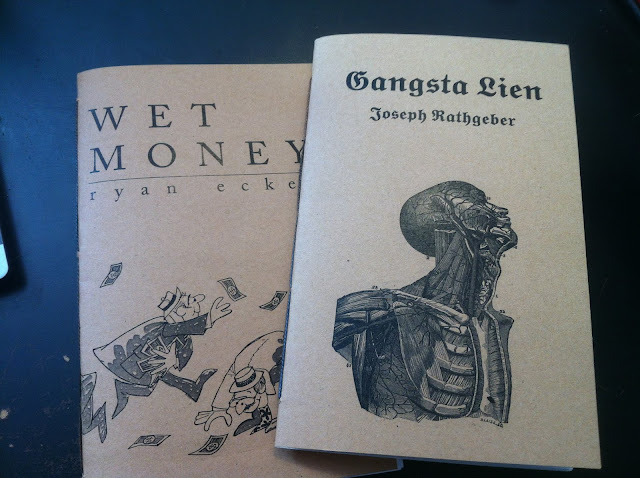wet
money
to be rehired every other
breath
as if you were never
there
nothing ever happened
you never worked here
we never knew each other
the waves crash the shore
you were never here (ryan
eckes)
I
recently received copies of the two latest chapbooks from Philadelphia chapbook
publisher radical paper press: Joseph Rathgeber’s Gangsta Lien (2020) and ryan eckes’ WET MONEY (2020). Producing works as copyright-free (each chapbook
includes the back-cover tag-line “copyright is for cops”), I like very much the
anti-capitalist aesthetic that radical paper press is establishing, something
that comes through how they produce and distribute works, as well as through
the works they choose to publish. As their Duotrope listing reads: “We are anti-profit. We are anti-work, so lower your expectations.
We run on appropriated paper. We are handmade. We are saddle-stitched, or stapled,
or stab bound, or coptic stitched, or folded, or glued. We are printed in
manifold ways. We are broke. We rely mostly on stolen materials.”
The
author of a handful of full-length poetry titles, ryan eckes’ latest is the
chapbook WET MONEY, a title that continues
his exploration via language and the lyric through issues of economic class and
the working poor. He opens the chapbook with this short, untitled lyric: “the
pure products of the liberal imagination / do not exist // the sky is cash only
// you drive the car / to work // for an earth of / its excrement // some hard
pressed / house in the suburbs— // some bill— [.]” Whether he is aware of the
work or not, there are echoes here from some of the Kootenay School of Writing
poets that emerged in the 1990s, echoes of language and patterns of Jeff Derksen and Colin Smith, among others, as he opens the extended, three page
poem “a book of stamps,” writing:
to be on a stamp, you
have to be dead ten years. if you were president, only five years.
you learn the rules
standing in line at the post office.
in a book called Standing in Line for Death,
CAConrad wrote, “let us write the news on your newborn’s face.”
the news today is one
capitalist clapped for another but didn’t really mean it.
one forever stamp costs
55 cents.
the stamp is
self-adhesive. you don’t need to lick it.
In
comparison, Joseph Rathgeber’s Gangsta Lien leans less away from the fragment
of ryan eckes, and into more narrative decaratives and essay-poems. Paired, these
titles appear two sides of a similar perspective, writing out declarative
explorations into class struggle, as the poem “3000 MILES” opens with “This is
no time to be economical: it’s not / a numbers game.” Further on, as he writes:
“They’ll revoke your privileges, // void your fellowships, quash your
residences. / Bar you and ban you from grants, philanthropic // gestures, the
UPC codes, the ISBNs, the Library / of Congress CIP data. If you mention the
word // capitalism they will call you dogmatic, demagogic, / didactic,
and tell you: die, poet, die. There is // too much beauty in the world to bear.”
FAIR USE
This poem won’t be in
syndication: it is summer air blown back in my face, stealing the moisture from
my eyeballs—this is speaking into an oscillating fan. It’s in the ether. Either
embrace the poem as a Today Only deal or retweet and reblog at your own risk: I
will personally scourge a consumer’s back, a customer’s hindquarters, with a
switch of ethernet cable coiled around my knuckles. CURB ALERT: this one’s on
its way out. It’s the Last Fair Deal Gone Down. The blues were never meant to
be recorded—Black men’s souls were stolen. By Plato’s count, the 78 RPM is
mimesis twice removed: a cheap imitation, a copycat, a Kinko’s part-timer on a
wildcat strike. Who’s pocketing the profits? This poem sunbathes in the public
domain. It’s a syndicalist with a black armband, picketing with the chant: The
money won’t mine.



No comments:
Post a Comment